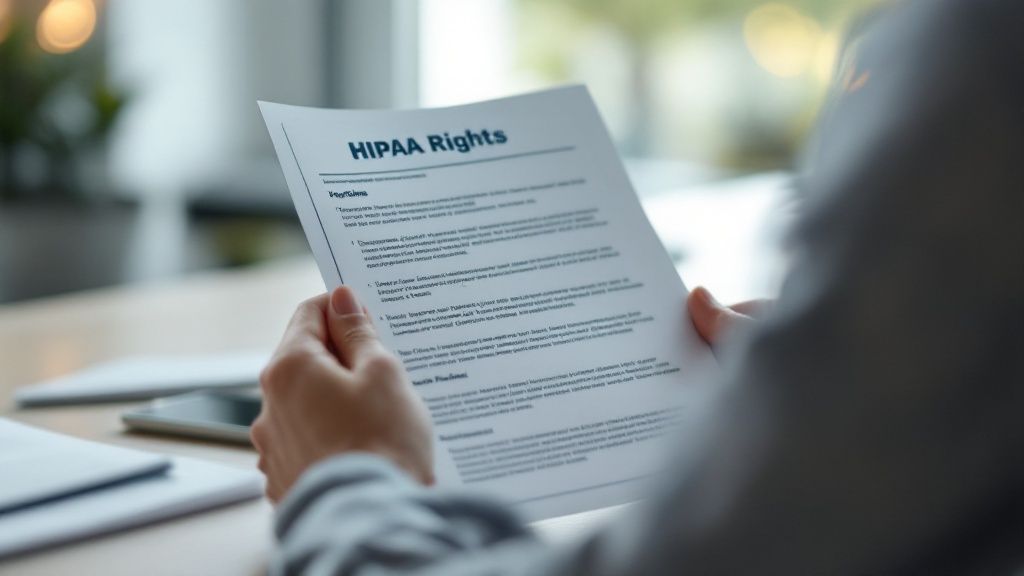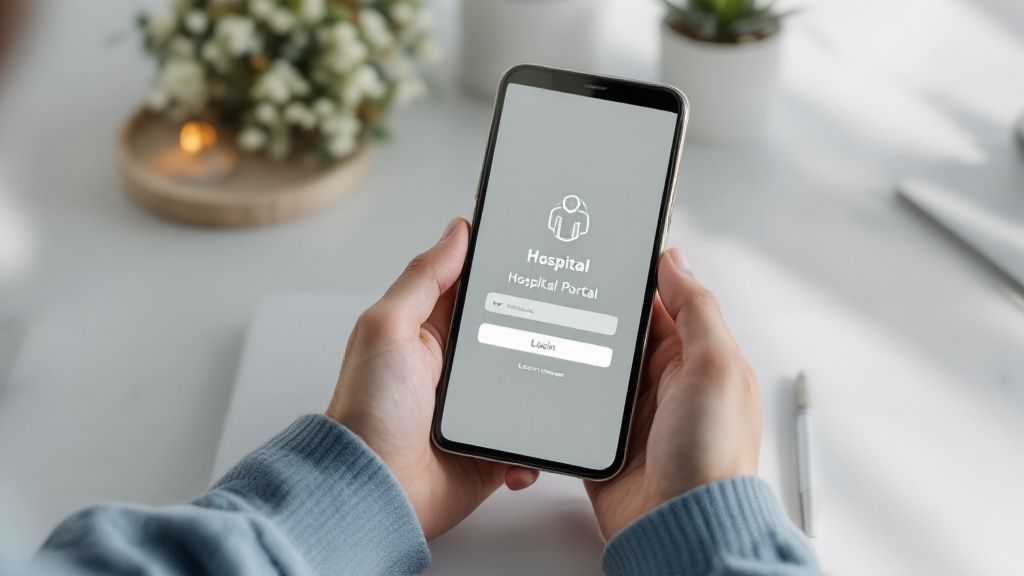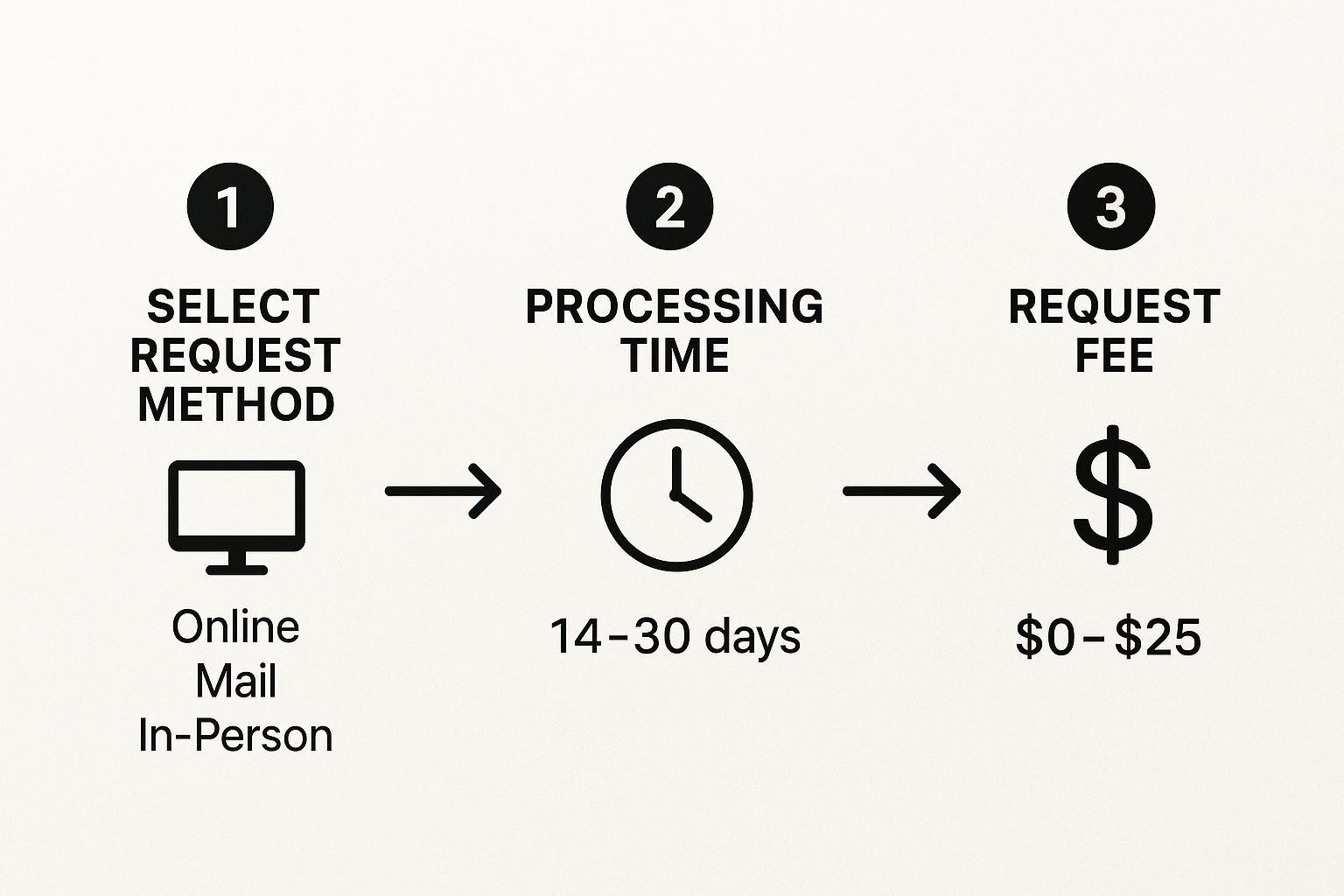Your Guide on How to Get Medical Records
"I was satisfied once John Bell took over my case."
"Communication was always timely."
Your Guide on How to Get Medical Records
Knowing how to get your medical records is one of the most important things you can do for your health. The process boils down to a few key actions: figuring out every single place you've received care, officially requesting your files with their specific forms, and knowing your rights to make sure you get what you need, when you need it. Taking these steps puts you back in the driver's seat of your own healthcare.
Knowing Your Rights to Access Medical Records

Before you ever pick up the phone or fill out a form, the most powerful thing you can do is understand your legal rights. The cornerstone of your access to health information is a federal law you've probably heard of: the Health Insurance Portability and Accountability Act (HIPAA).
Most people think of HIPAA as just a privacy rule, but it does so much more. It actually guarantees your right to access your own protected health information. Think of it this way: when you ask for your records, you aren't asking for a favor. You are exercising a right that is protected by federal law.
What Is Actually in Your Medical File
Your medical file isn't just a brief summary of visits. It's the complete, detailed story of your health. Knowing exactly what's in there helps you ask for the specific information you need, which is absolutely critical for a personal injury claim or when applying for benefits.
Here’s a look at what you can typically expect to find and can request:
- Physician’s Notes: These are the detailed observations, official diagnoses, and treatment plans from your doctors.
- Test and Lab Results: All the raw data, like blood work reports, pathology findings from biopsies, and other diagnostic results.
- Imaging Scans: This includes not just the radiologist's written interpretation but the actual images from X-rays, MRIs, and CT scans.
- Billing Information: A complete history of charges for every service and treatment you've received.
One of the biggest myths I hear is that people can't get their doctor's private notes. While it's true that "psychotherapy notes" are handled differently and require a special authorization, all other clinical notes about your diagnosis and treatment are part of the medical record you have a right to request.
Having this level of detail is non-negotiable for building a strong case. For example, if you're pursuing a personal injury claim, these documents are the bedrock of your evidence. A complete set of records is just as crucial if you find yourself navigating the complex process of filing for disability benefits, where every single detail can make or break your application.
Finding Every Provider Who Holds Your Records

Here’s a hard truth: your complete health history almost never lives in a single, neat file. It’s almost always scattered across a web of different clinics, hospitals, labs, and specialists you’ve seen over the years. This initial detective work is the first real hurdle in getting your medical records, and for a personal injury claim, it’s absolutely critical. Every detail counts.
Think of yourself as a puzzle master. Each provider holds a crucial piece of your medical story. Missing just one can create a hole in your timeline that an insurance adjuster will be more than happy to exploit. Start by brainstorming every single medical professional you can remember seeing, and then dig deeper from there.
Create Your Provider Master List
To make sure nothing gets missed, the first thing you need to do is build a master list. It's surprisingly easy to forget a one-off visit to an urgent care clinic five years ago or a short round of physical therapy after a minor incident. These forgotten records can sometimes be the most important.
Your list should include every provider you can think of, such as:
- Primary Care Physicians (PCPs): List all of them, even if you only saw them once or twice.
- Specialists: This means everyone—cardiologists, orthopedists, dermatologists, neurologists, you name it.
- Hospitals and Emergency Rooms: Document every visit, whether it was for an emergency, a planned surgery, or an overnight stay.
- Urgent Care Clinics: These are the ones people forget most often, but their records are essential for showing a consistent pattern of care.
- Therapeutic Services: Don't leave out physical therapists, chiropractors, occupational therapists, or mental health counselors. Their notes often contain detailed observations about your pain and limitations.
A great tip is to think chronologically about your injury. Where did you go first? Who did they refer you to next? Following that chain of referrals is a surefire way to retrace your steps and identify every single provider who was involved in your treatment.
Uncovering Less Obvious Record Holders
Beyond the usual suspects, your medical information is often tucked away in places you might not immediately consider. Broadening your search is the key to building a rock-solid, undeniable record of your health journey.
Be sure to track down these often-overlooked sources:
- Pharmacies: Your pharmacy has a detailed history of every prescription you've ever filled. This is powerful evidence of your injuries and the treatments required.
- Imaging and Lab Centers: Standalone facilities that perform X-rays, MRIs, CT scans, or blood work keep their own separate records.
- Ambulance Services: If an ambulance transported you, the crew created a detailed "run report." This report is separate from the hospital's records and contains crucial on-scene information.
Don't forget about specialized situations, either. For example, you might need to find records from home-based clinical research if you ever participated in a study. Each of these sources adds another layer of detail, reinforcing the facts of your case. Being meticulous now will save you from major headaches and strengthen your claim down the road.
The Official Process for Requesting Your Medical Files

Alright, now that you've got a complete list of every doctor and facility that has a piece of your medical history, it's time to actually get your hands on those records. This isn't as simple as phoning the front desk. Healthcare providers have specific, formal procedures for this, and your request has to go to the right people.
You're looking for the Health Information Management (HIM) department, though some places still call it the Medical Records office. This is your target. Head to the provider's website or give their main line a call and ask to be connected directly to them. These are the folks who manage all patient files and are the only ones authorized to process your request.
Finding and Filling Out the Right Form
Thanks to HIPAA, a provider can't just hand over your records without your clear, written permission. This is handled with an official "Authorization to Release Health Information" form. Most hospitals and larger clinics have these forms available for download right on their websites, usually in a "Patient Services" or HIM section.
If you can't find it online, no problem. Just call the HIM department and ask them to email or mail you a copy. This form is a legal document, so getting it right the first time is key to avoiding frustrating delays.
You'll need to provide some specific details to verify your identity and tell them exactly what you need. Be ready to fill in:
- Your full legal name, plus any previous names you’ve used.
- Your date of birth to make sure they're pulling the correct file.
- The specific date range for the records you're after.
- The types of records you want (e.g., doctor's notes, lab results, X-ray reports).
- How you want them delivered—electronically through a patient portal or as paper copies.
A common mistake I see is people being too vague. Don't just write "all my records." Be specific. For example, "all records from January 1, 2023, to the present." This keeps you from getting—and paying for—a massive stack of irrelevant childhood medical files when all you need is information tied to your recent car accident.
Sending Records to Yourself vs. Your Attorney
The process has a slight fork in the road depending on where the records are going. If you're just getting them for your own review, you’ll list yourself as the recipient. It's a straightforward path that puts the information directly in your hands.
However, if this is for a personal injury or disability claim, it's almost always smarter to have the records sent directly to your attorney. On the authorization form, you’ll name your law firm as the authorized third-party recipient. This ensures your legal team gets the official, certified copies they need to build your case, cutting out the middleman and saving you a step. This is especially critical for complex situations, like when you need to gather documentation for a Social Security medical records request as part of a disability application.
Getting medical records quickly has become a massive business. The global Medical Records Retrieval Market was recently valued at around USD 1.1 billion and is projected to hit USD 2.8 billion by 2034. This boom is fueled by the widespread adoption of electronic health records (EHRs) and the constant need for data in legal and insurance claims. It just goes to show how vital this information has become.
One final tip from experience: before you send that form in, make a copy for yourself. It’s your proof that you submitted the request and when you did it.
When you're trying to get your medical records, it’s easy to think HIPAA is the only rulebook. But that’s not the whole story. HIPAA sets the federal baseline—the absolute minimum standards every healthcare provider in the country has to follow. The real game-changer? State laws.
Think of it this way: federal law is the foundation, but your state can build a much more patient-friendly house on top of it. A state might force a hospital to hand over your records much faster than HIPAA's 30-day window or put a strict cap on what they can charge you for copies. Knowing these local rules can save you a ton of time and money, but you have to know they exist to benefit from them.
The process for requesting records generally follows a standard path, but those little details determined by your state can make a world of difference.

As you can see, the basic steps are straightforward. However, the specific timelines and costs are where your state's laws really come into play.
A Real-World Example from Oregon
Let's look at Oregon to see just how much this matters. Under the federal HIPAA rules, a provider has a full 30 days to respond to your request. If you're building a personal injury claim, a month is an eternity.
But in Oregon, the law is on your side. State statutes here require a provider to provide copies of your records within 14 calendar days. They must also let you inspect the records in their office within just five business days. That’s a massive improvement when you’re up against a deadline.
The cost is another area where Oregon law provides extra protection. The state sets very clear limits on what you can be charged:
- A flat $30 for the first 50 pages.
- Just $0.50 per page for the next 450 pages (pages 51-500).
- And only $0.25 for each page after that.
These fee caps are a big deal. HIPAA's rule about a "reasonable, cost-based fee" is notoriously vague and can be interpreted in all sorts of ways. Oregon’s specific pricing structure removes that gray area and protects you from getting hit with a surprisingly large bill.
HIPAA Federal Guidelines vs. Oregon State Law
It can be tricky to see how federal and state rules interact. This table breaks down some of the key differences using Oregon as an example, showing how state law often provides stronger patient protections.
| Response Timeframe | Within 30 calendar days of receiving the request. | Copies must be provided within 14 calendar days. |
| Inspection of Records | Not explicitly defined; part of the 30-day access right. | Must be available for inspection within 5 business days. |
| Copying Fees | "Reasonable, cost-based fee" for labor, supplies, postage. | Capped at $30 for 50 pages, with a tiered per-page fee after. |
| Format of Records | Must provide records in the format requested, if readily producible. | Aligns with federal standards, allowing for electronic copies. |
As you can see, the state-level rules in Oregon give patients a clear advantage in both speed and cost, demonstrating why it's so important to look beyond the federal guidelines.
Navigating Federal vs. State Differences
So what happens when the state and federal rules don't line up? The rule of thumb is simple: whichever law is more favorable to you is the one that applies.
A state can give you more rights than HIPAA, but it can never take away the minimum protections that federal law guarantees. If your state demands a 14-day turnaround, your provider can't hide behind HIPAA's 30-day rule. They have to follow the stricter state law.
The best way to get a handle on your local rules is to do a quick search for "[Your State] medical records law" or "[Your State] medical records fees." Stick to official government or health department websites for the most accurate information. A few minutes of research can empower you to confidently request your records, push back on delays, and ensure you aren’t being overcharged.
What to Expect for Fees and Delivery Options
So, what's this going to cost you? Requesting your medical records isn't always free, but the good news is the fees are regulated by law and should be reasonable. Under HIPAA, your doctor's office or hospital can only charge a “reasonable, cost-based fee” that covers their actual labor and supply costs for getting the records to you.
This isn't meant to be a money-maker for them. The idea is just to cover their expenses.
Here’s what those fees can legally include:
- Labor: The time a staff member spends actually copying your files.
- Supplies: The cost of things like paper and toner, or a CD/USB drive if you need a physical copy.
- Postage: The exact cost to mail the records, if you choose that option.
What they can't charge you for is the time it takes them to search for and retrieve your records in the first place, even if your file is buried in a dusty archive. The fee is strictly for the work involved in making the copies and sending them.
Your Best Bet: Go Digital
These days, the fastest and cheapest way to get your records is almost always electronically. The massive shift to Electronic Health Records (EHRs) has made digital delivery the new normal for most healthcare providers.
This isn't just a small trend. It's a huge change in how healthcare operates. More than 95% of U.S. hospitals now use EHR systems, and the global market for this technology is expected to hit $40.39 billion by 2027. If you're curious, you can explore more data on EHR adoption rates to see just how widespread this is.
Because of this digital shift, you've got options:
- Patient Portal: This is often the best choice. Many providers have a secure online portal where you can view and download your records instantly, usually for free.
- Email: Some offices might send records via secure email, but this is becoming less common due to privacy risks.
- CD or USB Drive: For big files, like MRI scans or X-rays, they might put them on a physical drive for you.
When you fill out your request form, make sure to specify an electronic format. It will almost always be cheaper—or even free—compared to getting a massive stack of paper copies.
Pro Tip: Always ask for a cost estimate before they start the work. This is your chance to catch any surprisingly high fees and make sure they line up with state and federal rules. Don't hesitate to ask for an itemized breakdown of the charges if something looks off.
Making Sure the Fees Are Legit
While HIPAA sets the federal baseline, your state might have its own laws that are even more protective. As we saw with Oregon, some states have very specific fee schedules that prevent providers from hiding behind a vague "reasonable fee" excuse.
If a fee seems way too high, don't be afraid to push back politely. A quick search for "[Your State] medical records fees" should lead you to the specific laws. Knowing your rights is the best way to ensure you only pay what's fair and legally required to get the documents you need for your claim.
Got Questions About Getting Your Medical Records? We’ve Got Answers.
Even with a solid plan, trying to get your medical records can feel like you're navigating a maze blindfolded. It’s completely normal to run into roadblocks and have questions pop up. But don't worry, these hurdles don't have to stop you.
Let’s walk through some of the most common snags people hit. What do you do if a doctor’s office just says "no" or completely ignores the legal deadline? Or what if you’re trying to get records for your child or an elderly parent? These are real-world problems with practical solutions.
What if a Provider Denies Your Request?
It's incredibly frustrating when a provider denies your request for your own records, but a "no" is rarely the final answer. The very first thing you should do is ask for that denial in writing. HIPAA law is very clear, and there are only a handful of legitimate reasons a provider can refuse. A written explanation forces them to go on record with their justification.
You might hear some common (but often invalid) excuses, such as:
- You have an outstanding bill: A provider cannot legally hold your records hostage over an unpaid bill.
- They think you're a "difficult" patient: Your personal relationship with the office has zero bearing on your legal right to your health information.
- The doctor thinks it will upset you: In most cases, a doctor’s opinion that the information might be distressing is not a valid reason to withhold your file.
If their reason doesn't hold water, your next move is to send a formal letter. Politely but firmly remind them of their obligations under both HIPAA and Oregon state law. If they still won't budge, you can file an official complaint with the U.S. Department of Health and Human Services.
What if You Find an Error in Your File?
Finding a mistake in your medical records can be jarring, but you have the right to ask for a correction. Your first call should be to the provider's Health Information Management (HIM) department. Ask them about their specific procedure for amending records.
Typically, you'll need to submit a formal written request. In it, you should clearly explain the error and include any proof you have to back up your claim. The provider isn’t actually required to delete the original entry, but they must add your amendment to the file. This ensures your side of the story is officially part of your permanent record.
Getting this right is absolutely critical, especially when your records are needed for a legal claim. One uncorrected mistake could have a ripple effect on everything. This is especially true when preparing for something like a disability hearing, where the accuracy of your medical timeline is everything. You can find more details in our guide on how to prepare for a disability hearing.
How Do You Access Records for a Child or Another Family Member?
When you need to request records for someone else, whether it's your child or an aging parent, you’ll need to prove you have the legal authority to do so. For a minor, parents and legal guardians can usually get the records simply by providing proof of their relationship (like a birth certificate).
For another adult, you’ll need to be their designated healthcare agent, which usually means having a Medical Power of Attorney. The process is basically the same—you'll fill out the standard authorization form, but you will also need to provide a copy of the legal paperwork that gives you permission to act on their behalf.
Thankfully, the widespread shift to digital records has made this whole process much smoother. The global market for Electronic Health Records is projected to hit USD 43.36 billion by 2030, with cloud-based platforms leading the charge. This evolution makes sharing authorized records far more efficient than the old days of paper, fax machines, and snail mail. You can read more about the growth of EHRs on grandviewresearch.com.
Once you have all the records, keeping them organized and secure is the next big step. A digital tool can be a lifesaver here; this guide to a free document management system is a fantastic place to start.
At Bell Law, we know that getting and organizing medical records is one of the most important—and sometimes frustrating—parts of a personal injury or disability claim. If you're hitting a wall and can't get the documents you need, our team is here to take that burden off your shoulders. Visit us at https://www.belllawoffices.com to see how we can help.
Disclaimer: The information on this page is provided for general informational purposes only and is not legal advice. Reading this content does not create an attorney-client relationship. For advice about your specific situation, please contact a licensed attorney.







